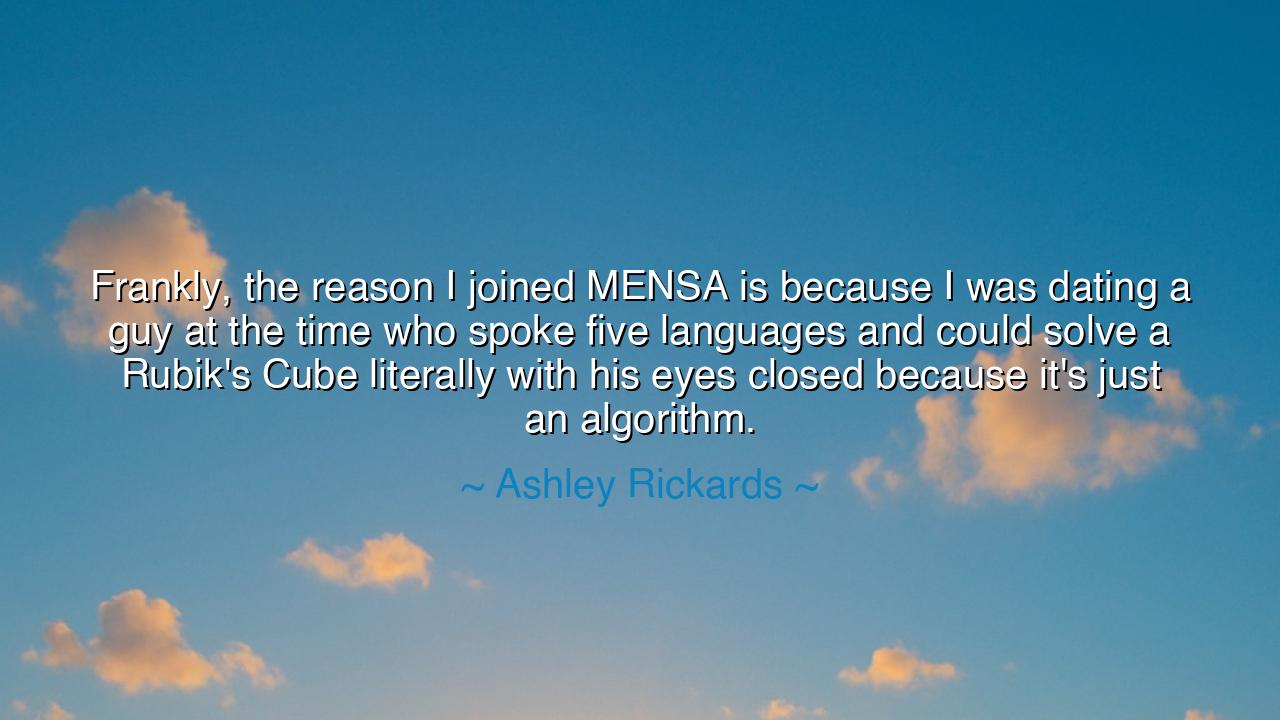
Frankly, the reason I joined MENSA is because I was dating a guy
Frankly, the reason I joined MENSA is because I was dating a guy at the time who spoke five languages and could solve a Rubik's Cube literally with his eyes closed because it's just an algorithm.






In the candid spark of Ashley Rickards’ confession—“Frankly, the reason I joined MENSA is because I was dating a guy who spoke five languages and could solve a Rubik’s Cube with his eyes closed because it’s just an algorithm”—we hear the ancient friction that polishes ambition. Desire meets comparison; wonder meets will. A single boast in a kitchen or a library can become a flint against our softer places, striking a vow: “I, too, will lift my mind.” The line is playful, yes, but beneath the humor lies a stern old truth: admiration is a ladder, if you climb it; a cage, if you only stare.
The origin of the quote is personal, small in scale, and therefore universal. A companion’s gifts—five languages, a blindfolded cube mastered by algorithm—rearrange the furniture of the room. What seemed rare becomes reachable, what seemed mystical becomes procedural. In the ancients’ tongue, this is paideia: the education of the soul by examples living and near. She joined MENSA not to worship genius from afar, but to step into a hall where effort has form and challenge has company. It is the age-old passage from spectator to participant.
Mark how the sentence demystifies skill. The Rubik’s Cube, like many daunting arts, yields not to frenzy but to a path: an algorithm, a choreography of moves that turns chaos into color. This is wisdom from before the abacus—order is hidden in the maze. The lover who shows the pattern, even by accident, becomes a guide. Thus the boast becomes a blessing: a door cracked, a corridor glimpsed, a decision made. She answers with action—joined MENSA—and in so doing affirms that intellect, too, is a craft that grows under discipline.
History offers a mirror in the life of Émilie du Châtelet. Drawn into the orbit of Voltaire, she would not remain a satellite. Admiration ripened into rivalry of the noblest sort: she mastered mathematics, translated and expanded Newton’s Principia, and altered the course of physics through her insight on energy. The spark came from nearness to a brilliant mind; the fire was her own. So with Rickards: proximity to excellence can either bruise or build. She chose to build.
The quote also warns against idolatry of talent. Five languages impress; so do titles etched on cards like MENSA. But the ancients prized balance: knowledge is a temple, not a trophy case. To solve with eyes closed is a marvel; to see clearly with eyes open—about one’s vanity, one’s fear, one’s motives—is rarer. Let the algorithm you seek not only permute colors on a cube but re-order the heart’s economy: less envy, more effort; less theater, more study; less posing, more practice.
What, then, is the lesson to be carried forward? Let admiration become apprenticeship. When another’s prowess stirs you, translate awe into a syllabus. Choose standards that sharpen without shrinking your soul. The wise do not deny the sting of comparison; they make medicine of it. They say: “Teach me the steps. Give me the book list. Show me the drill. I will return tomorrow.”
Practical actions follow like counted beats. (1) Pick one domain that dazzles you—languages, logic, music—and uncover its algorithm: the daily pattern that builds mastery. (2) Replace vague goals with measured ladders: twenty minutes of spaced-repetition for vocabulary, ten classic puzzles a week, one problem set each dawn. (3) Seek a circle—club, cohort, mentor—where excellence is ordinary and help is near; badges like MENSA matter less than communities that expect growth. (4) When admiration curdles into envy, write one page on what is procedural about the feat you envy, and begin the first step that same hour. (5) Keep your eyes open: let intellect serve character, and let every victory return as generosity to those still outside the door you just opened.
At last, hear the ancient cadence beneath the modern jest: greatness is not a thunderclap; it is a metronome. Someone nearby kept the time; you learned the rhythm. Bow to the spark that woke you—yes—but kindle your own flame and tend it without boasting. For the true solution to the cube of life is not merely to permute its faces, but to align its colors with purpose: curiosity, humility, perseverance, and joy.






AAdministratorAdministrator
Welcome, honored guests. Please leave a comment, we will respond soon